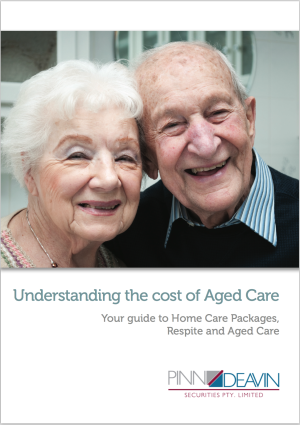
Having a financial plan is important when we are young and working to provide for our retirement. But it is also important to have a plan for our later years when we may not be able to look after ourselves as well and may require more assistance from others.
If we make a plan for our aged care now, then the burden will not have to fall on our families and loved ones. And questions such as whether we can access the aged care we want, whether it will be affordable, what the tax consequences will be, and so on, will already be answered in our plan.
Whether you’re considering aged care planning for yourself, a parent, partner or loved one, Pinn Deavin aims to provide answers to the most commonly asked questions and to help you avoid some of the potential pitfalls that hasty decisions can lead to.
What is a care plan in aged care?

A care plan is a plan that outlines what your care needs are likely to be in the future. It includes the kinds of services you wish to receive in order to meet those needs, who will provide the services, how much it will cost and how much you will need to pay for them. A care plan is normally developed by a financial planner in consultation with yourself and your loved ones.
You should ideally begin aged care planning once you retire and continue planning throughout your retirement so that you are well prepared for all eventualities. Questions to ask yourself when preparing your aged care plan could include:
Do you want to live in your own home for as long as possible?
What will happen to your home once you can no longer live independently?
How will you pay for your aged care accommodation costs?
Do you have investment strategies in place for your assets?
What will the tax implications be?
How will your pension be impacted?
Benefits of advance care planning

As well as the financial aspects of aged care planning, another important consideration is advance care planning. This is a plan that outlines your wishes if you were to become unable to make decisions for yourself. It provides a guide for your loved ones and care providers, allowing them to make decisions about your care in line with your values and preferences.
As part of your advance care plan, you can nominate someone as a substitute decision-maker who will be your advocate in such circumstances. They can act on your behalf if questions about your care, such as if life-prolonging treatments are raised, so that you can be confident that your wishes are known and understood.
Advance care planning is particularly important for those who have a chronic illness, multiple diseases or early cognitive impairment. Treatment decisions that might need to be made in such circumstances could include cardiopulmonary resuscitation (CPR), artificial ventilation (breathing machines), tube feeding, dialysis (kidney machine), palliative care, blood transfusions, surgery, and chemotherapy or radiotherapy for cancer.
If your treatment preferences aren’t known, healthcare providers may opt for aggressive treatments that you might not have wanted. Your family may also feel burdened by the stress of having to make such decisions on your behalf, so having an advance care plan that clearly outlines your beliefs, values, and treatment preferences can provide peace of mind not only for you but for your loved ones as well.
Types of aged care

The Australian Government provides subsidised aged care services for elderly people in the community. These services include home care for those needing additional support to maintain independent living and residential aged care, which is provided through funding agreements with various aged care facilities.
Home care
Entry level home help is provided to the elderly through the Commonwealth Home Support Programme (CHSP). Services include social support, transport, domestic assistance, personal care, home maintenance, home modification, nursing care, meals, and allied health services. Those requiring such services pay a contribution towards the cost while service providers receive Australian Government funding through grant agreements.
Higher level home help is provided through the Government’s Home Care Packages (HCP) Programme, which offers packages of care supplied by approved home care providers. Each package is tailored to the person’s individual needs and allows them to have more flexibility when selecting the services they require.
Support packages range from Level 1 for those with basic care needs up to Level 4 for those with high care needs and clients are required to contribute to the cost of their care by paying a daily fee of up to 17.5% of the single Age Pension. Part-pensioners and self-funded retirees are also required to pay an income-tested fee.
Residential aged care
Residential aged care is funded partially by Government subsidies to providers and partially by contributions from residents of aged care facilities. Residential aged care is for those who need more care than can be provided in their own homes and services include accommodation, personal care, support services (i.e. meals and laundry), nursing care, and some allied health services.
The Government’s Aged Care Funding Instrument (ACFI) is used to calculate the subsidy paid to providers for each permanent resident in an aged care facility. It consists of a series of questions that assess their level of need across three main areas: Activities of Daily Living, Behaviour and Complex Health Care. The higher the assessed need in each area, the higher the subsidy paid for that resident.
Residents must also contribute to the cost of their accommodation and care by paying a daily fee of 85% of the single Age Pension. Those with greater means will also pay a means-tested care fee, based on their income and assets and also an accommodation price agreed with the aged care facility.
Cost of aged care

The cost of home care and residential aged care is something you need to address in your plan so you know you will have sufficient funds to pay for the services you will need.
Eligibility for these services is determined by an Aged Care Assessment Team (ACAT), a team of doctors, nurses and healthcare professionals who assess each person’s individual case to determine the services they are eligible to receive. The assessment is free of charge and most people are referred to ACAT by their treating physician, although you can apply for assessment yourself.
Cost of home care
Your ability to contribute towards the cost of your home care services is assessed by the Government and is based on your assessable income which includes your pension entitlement. If your income is above a predetermined threshold, you will be required to contribute towards your home care at the rate of 50¢ for every dollar above the threshold.
As mentioned previously, all recipients of home care services must pay the basic contribution rate of 17.5% of the pension (currently $10.17 a day). On top of this, part-pensioners and self-funded retirees will pay an income-tested care fee which is up to $5,313.30 per annum for part pensioners and up to $10,626.59 per annum for self-funded retirees. There is a lifetime limit of $63 759.75 for both the income-tested and means-tested fees.
Cost of nursing homes
You can pay for the cost of your residential aged care accommodation in a lump sum called a Refundable Accommodation Deposit (RAD), in a Daily Accommodation Payment (DAP) or in a combination of both of these.
While a Refundable Accommodation Deposit is an exempt asset when calculating your pension entitlement, it is included when calculating your assets for the means-tested care fee.
If you don’t pay or only part-pay the Refundable Accommodation Deposit, your Daily Accommodation Payment will be calculated on that unpaid portion at a government set interest rate.
Also mentioned previously, residents must contribute to their accommodation and care by paying a daily fee of 85% of the pension. The formula for the means-tested care fee that applies on top of that is as follows:
50¢ in each dollar of income over $26327.60 per annum for singles and over $20 454.20 per annum each for couples
17.5% of assets between $47 500 and $162 815.20
1% of assets between $162 815.20–$393,445.60
2% of assets over $393 445.60
Minus the maximum accommodation supplement (currently $55.44 a day)
If your assets and income fall below these thresholds, you are considered a low-means resident and will not have to pay an accommodation fee. Aged care facilities are required to cater for a certain proportion of financially disadvantaged residents in order to receive their government funding, so not having enough money will not prevent you from having access to aged care accommodation.
Preparing your aged care plan

It is important to seek professional advice from a licensed financial planner when preparing your aged care plan because everyone’s circumstances are different and you need to have a plan that is tailored to your individual needs.
Pinn Deavin can help you understand the fees, charges and other expenses involved and provide help in managing the timing of entry into residential aged care and organising your assets to generate the cash flow needed.
At Pinn Deavin, we specialise in aged care planning and advice and we can help you understand your own cost of aged care by:
Identifying the fees and charges that will apply to you
Evaluating the affordability in the short and long term
Calculating your pension entitlement and other benefits
Discussing the options for meeting your costs
Providing a comprehensive analysis of your options so that you can make informed choices
We can work with you and your family to assess income, assets, and eligible subsidies and create a financial plan to ensure that your future care is affordable. We can also assist with introductions to other specialised aged care services including legal, accommodation, and related services.
To find out how we can help you plan for a level of age care that is both comfortable, dignified and affordable, contact Pinn Deavin today at https://www.pinndeavin.com.au/contact-us/.




